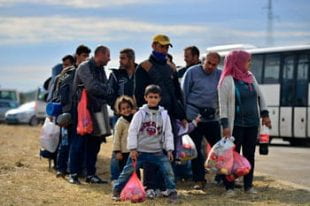Jeff Falk
713-348-6775
jfalk@rice.edu
US needs to maintain refugee resettlement program, Baker Institute expert says
HOUSTON – (Nov. 20, 2019) – The United States needs to both maintain its refugee resettlement program and continue to provide international aid that supports countries hosting the vast majority of refugees, according to a new report from Rice University’s Baker Institute for Public Policy.
Historically, the U.S.’s role as a resettlement country has been crucial, said Kelsey Norman, fellow for the Middle East at the Baker Institute and author of the issue brief, “The End of the Largest Resettlement Program in the World?” At its peak from 1990 to 1995, 116,000 refugees arrived in the U.S. each year on average. This number plummeted in 2002 following the terrorist attacks on Sept. 11, 2001, but from 2008 to 2017 an average of 67,000 refugees arrived in the U.S. each year, reaching a high of nearly 85,000 in 2016.
Following President Donald Trump’s inauguration, the number of refugees resettled in fiscal year 2017 fell to 53,000, followed by just 22,500 in 2018. For the first time ever, Canada surpassed the U.S. as the world’s primary resettlement country. For fiscal year 2020, which began Oct. 1, Trump set the ceiling for refugee admissions at 18,000, meaning far fewer will actually be successfully admitted, Norman said.
“If the U.S. — the wealthiest country in the world — shirks its responsibilities toward refugees by ending the world’s largest resettlement program, there is nothing to prevent other countries hosting millions of refugees from expelling these individuals and forcibly returning them to their countries of origin where their lives are likely to be in danger,” wrote Norman, who is also director of the Baker Institute’s Women’s Rights, Human Rights and Refugees in the Middle East and North Africa program.
In proposing such a lower ceiling for fiscal year 2020, the Trump administration has argued that it must cut refugee admissions in order to focus on the increase of asylum-seekers arriving in the U.S.
“In reality, the system responsible for managing and adjudicating the claims of asylum-seekers is completely separate — bureaucratically and financially — from the system managing refugee admissions,” Norman wrote. “What is more likely is that the refugee admissions cut is part of a larger plan by the Trump administration to minimize, if not entirely end, both legal and irregular immigration to the U.S.”
Norman said another argument against refugee resettlement relates to cost: Why fund refugees to come to the U.S. when the U.S. can instead offer aid to countries such as Jordan, Turkey or Kenya to host refugees there? “Indeed, this argument already underlies the global practice of hosting most refugees in countries of the ‘global south,’ which rely on financial and material support from wealthy states in the ‘global north’ — the so-called ‘grand bargain’ of refugee hosting,” she wrote.
Yet the Trump administration’s 2020 budget proposal called for steep cuts to foreign humanitarian assistance that supports refugees residing in global south countries, and in 2018 the administration ended its financial support of the United Nations Relief and Works Agency for Palestine Refugees in the Near East, which provides support to Jordan, Lebanon and Syria, Norman said.
Norman concluded, “This race-to-the-bottom scenario, whereby countries of the global south respond to the lack of moral authority from states in the global north, could lead to secondary displacement for refugees already in precarious environments and would almost certainly increase regional instability in fragile governance contexts.”
-30-
For more information or to schedule an interview with Norman, contact Jeff Falk, director of national media relations at Rice, at jfalk@rice.edu or 713-348-6775. The Baker Institute has a radio and television studio available for media.
Related materials:
Issue brief: www.bakerinstitute.org/media/files/files/6ad3c051/bi-brief-103119-cme-resettlement.pdf
Norman bio: www.bakerinstitute.org/experts/kelsey-norman
Follow the Baker Institute via Twitter @BakerInstitute.
Follow Rice News and Media Relations via Twitter @RiceUNews.
Founded in 1993, Rice University’s Baker Institute ranks among the top three university-affiliated think tanks in the world. As a premier nonpartisan think tank, the institute conducts research on domestic and foreign policy issues with the goal of bridging the gap between the theory and practice of public policy. The institute’s strong track record of achievement reflects the work of its endowed fellows, Rice University faculty scholars and staff, coupled with its outreach to the Rice student body through fellow-taught classes — including a public policy course — and student leadership and internship programs. Learn more about the institute at www.bakerinstitute.org or on the institute’s blog, http://blog.bakerinstitute.org.


